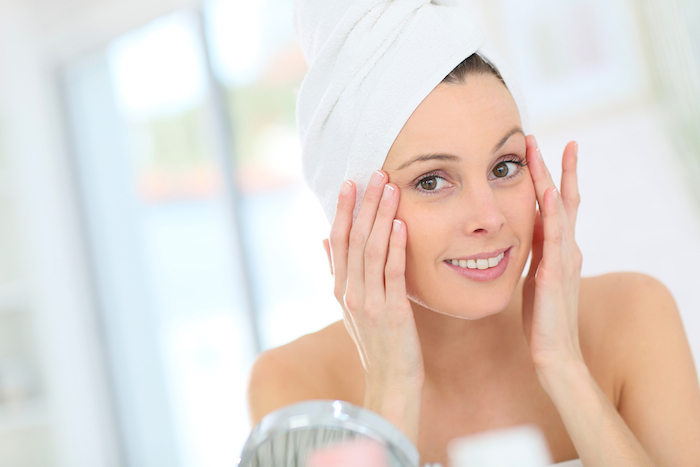Hyaluronic Acid Your Anti-Aging BFF

Hyaluronic acid is the new beauty ingredient you don’t want to live without, especially if you typically experience dry, flaky, and acne-prone skin. Hyaluronic acid helps your skin to retain moisture and can hold up to 1,000 times its own weight in water, so it keeps you looking fresh all year long. Here is what you need to know about hyaluronic acid.
Hyaluronic acid is a substance that the body normally produces on its own and is found in basically every part of the body. Hyaluronic acid plays a role in skin hydration, stimulating the production of collagen, scavenging for free radicals, fighting bacteria and inflammation, and maintaining fluid in eye tissues. As we age, however, the amount of hyaluronic acid in our bodies decreases dramatically. By the time we reach out mid-40s, the synthesis of hyaluronic acid in our bodies drops to half of what our bodies actually requires to function fully. Considering how vital the substance is in so many different functions, especially those related to beauty, you’ll both feel and see the difference over time.
Hyaluronic acid is what gives skin its volume and fullness. It works to correct wrinkles and folds on the skin as well as enhance lip plumpness. In addition to aging, extreme temperatures can adversely affect hyaluronic acid production. And with less hyaluronic acid in your cells, your skin can get dry, leading to acne, fine lines, and wrinkles. Hyaluronic acid softens, smooths and hydrates the skin.
No other biological substance can retain as much water as hyaluronic acid does, making the substance as important, if not more so, than collagen itself! It also goes further than its basic usage and helps skin cells to remove waste matter in areas where there is little blood circulation.
According to Dr. Linda Miles, D.O.M. and Chief-Formulator for local natural skincare brand derma e, there are certain foods that can help to increase hyaluronic acid in the skin. These include the connective tissues in animals (i.e. chicken skin or combs) as well as white potatoes, sweet potatoes and bananas. Additionally, Dr. Miles suggests consuming foods containing isoflavones, which strengthen estrogen levels, which in turn increase hyaluronic acid in the body. Isoflavones are found in soy products.
Despite these dietary perks, the best most direct way to increase the skin’s hyaluronic acid barrier is to use a natural skin care product rich in the substance. When applied to the skin, hyalauronic acid attracts and binds water molecules to the skin so that it always stays moisturized. Over time, the skin stays hydrated, appearing more visibly plump and without fine lines and wrinkles.
To reap the benefits of hyaluronic acid, try out derma e’s hydrating skin care line, which contains the substance. Each formula is enhanced with vitamins, botanicals and antioxidants that work together to moisturize and replenish the skin whilst reducing the signs of aging. Peter Thomas Roth makes its own hyaluronic acid serum called, VÍZ-1000, which boasts 75-percent potency. It is also fragrance-free and contains silk proteins, sea algae, honey, yerba santa, and a mineral complex. Glotherapeutics features hyaluronic acid in its products, as does LORAC in its liquid shine lipstick, Jane Iredale in its liquid minerals foundation and Dermalogica in its skin hydrating booster.
Related on Organic Authority
DIY Homemade Anti-Aging Face Cream Recipe
Facial Exercises: Facial Yoga is Your Non-Surgical Passport to Anti-Aging Bliss
How to Stay Hydrated By Avoiding 5 Common Pitfalls
Woman applying moisturizer from Shutterstock

